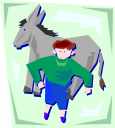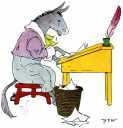
Jack, John, or Jenny.................? 
that is one of the basic questions you ask yourself when you decide to
find out what kind of donkey to look for. other times, a special donkey
'comes along' and you want to find out if he/she is suitable in temperament
for you and your family.
below is an introduction into basic care of donkeys and what to take into
consideration when you have to make up your mind about these choices.
general care/sizes
jenny
john
jack
the famous 'Jack Files' -- collected
and provided by camilla
|
Jack, John, or Jenny? Which gender would be the best donkey for you? No two donkeys are exactly alike. They are individuals with very distinct personality traits. Their behavior patterns can be influenced by environment, by gender, or by a learned habit. Once socialized with humans donkeys can be very affectionate and lovable. Donkeys are equines but a donkey's willingness to accept a human as a member of their herd and their ability to form an emotional attachment to a human make a donkey less horse-like and more of a companion animal similar to man's relationship with dogs. GENERAL CARE: A donkey needs grass or grass hay, fresh water and access to a salt and mineral block. They should have shelter from cold winds, snow, rain, and shade from the hot summer sun. They will need to have their feet trimmed at least once a year and more often in regions of the country where the environment does not wear off their hard hooves. This can be as often as every 8 weeks in some areas. They should receive annual vaccinations and your local veterinarian can tell you what is needed for your area. They will also need parasite control to protect them from internal parasites. This is also something your veterinarian can advise you on and most recommend a 60 day rotational worming program with simple to use equine paste wormers. I do not recommend Quest for worming donkeys. SIZES: Donkeys can be any size from a miniature
30 inches to 36 inches,
Miniatures can be taught to pull a cart or pack and standard, large standard, and mammoth donkeys can be taught to ride, drive and pack. A jenny
(jennet)
is a female donkey. Young jennets in some ways remind me of
human teenage girls. They giggle a lot and prefer to "hang out" in
groups. They are daddy's sweet, loveable, little girl until they
begin approaching sexual maturity. A young jennet can begin
having a monthly heat cycle as early as eight months old.
Baby donkeys
are adorable but before you decide to have your jennet bred take a moment
to consider your family pet will have a different and demanding job for
the approximately twelve months and twelve days of her pregnancy and for
up to ten months after the foal is born being a mother. Besides losing
your family pet for nearly two years another thing you should consider
is you will have the responsibility of training and seeing to the needs
of the foal for its entire life which can include finding a loving family
to adopt and love it if you decide you don't want to keep it.
I feel jennet owners should breed responsibility and not just because they want a cute, cuddly donkey foal. Before having a jennet bred sit down and talk it over with your family and make long range plans about what you will do with the foal, whether you will keep it or find a loving family to adopt it and give it a lifetime home. I am not anti-breeding but I do feel a very strong responsibility to protect and provide for the needs of all my children whether they are human or donkey. There are thousands of donkeys each year who are unwanted and without homes. A John donkey is a castrated jack and is also called a gelding. A donkey can be gelded as early as right after birth or later when he is older. The younger he is gelded the less likely he will develop jack-like tendencies. Geldings have a jack's intelligence but without the influence of the breeding hormones. A gelding focuses all of his attention on eating, sleeping, playing and socializing with humans. Because he is a castrated animal and no longer influenced by the breeding urges the purpose of a gelded donkey's life becomes being a love sponge to soak up all the attention and affection a human can give him. Their natural curiosity, intelligence, quiet and friendly nature make geldings excellent pets for the whole family. I highly recommend geldings for pets. A Jack
donkey is an intact breeding male donkey. With over
35 years of being a donkey trainer handling all ages, sizes, and genders
of donkeys I feel I have the knowledge and experience to state I do not
consider any jack to be a pet suitable to be around children or an inexperienced
handler. Unlike a jennet who only goes through a monthly cycle of hormones
urging her to mate, a jack's actions are controlled by his libido and he
is determined to breed any time his libido is stimulated by a sight, sound,
or scent. The primary purpose of his life is reproduction which is why
keeping a jack as a pet can be dangerous. The docile nature of a
donkey misleads people into thinking their jack can be a pet the same as
a gelded jack or a jennet.
For more information about jacks please look at the Jack Files. These 'files' are first-person accounts of owners and former owners of jacks who urge anyone to be VERY careful around a jack. They also include suggestions on how to set up a jack's living quarters so that it will keep him happy and keep you safe. I believe donkeys are magical creatures. After a long day at work I can spend time with my donkeys and all the stress disappears and I feel 20 years younger. There is something about a donkey that gives a person contentment. They teach us how to laugh again. They are a wonderful addition to a family and can be enjoyed by people of all ages. |

© 2001 Vicki
Abbott
web design and editing: sabine calkins